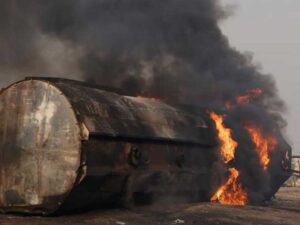By Jemimah Wellington, JKNewsMedia Reporter
WHILE MOURNING the tragic tanker explosion in Niger State, President Bola Tinubu stressed that the loss of life was preventable.
Promptly, he directed immediate medical support for survivors and ordered the transfer of critically injured victims to tertiary healthcare facilities for advanced care.
Additionally, he instructed security and road safety agencies to implement stronger measures to prevent such incidents in the future.
The explosion, which occurred days ago at Dikko Junction in Gurara Local Government Area, claimed 86 lives and left many others severely injured.
Witnesses described horrific scenes as residents, some scooping Premium Motor Spirit (PMS) from the overturned tanker, were caught in the blast.
The fire consumed victims and vehicles nearby, leaving the community in shock.
Tinubu has also tasked the National Orientation Agency (NOA) with launching a nationwide awareness campaign to educate Nigerians on the dangers of approaching accident sites, especially those involving fuel-laden vehicles.
He stressed that the explosion served as a stark reminder of the risks associated with fuel scooping, a practice that has led to numerous fatalities across the country.

Minister of Information and National Orientation, Mohammed Idris, led a federal delegation to the site.
He reiterated the government’s commitment to addressing the ongoing tanker explosion crisis, noting that over 265 people have died in similar incidents in the past five months.
He cited the October explosion in Jigawa State, which claimed 144 lives, and the September explosion in Agaie, Niger State, which killed 48 people.
In response, the federal government has formed a high-powered committee comprising agencies such as NEMA, the Federal Road Safety Corps, and the Nigerian Upstream Petroleum Regulatory Commission.
The committee’s mandate is to investigate the causes of these incidents and implement solutions to prevent future tragedies.
The Niger State Emergency Management Agency (NSEMA) confirmed the death toll and commended the swift response of emergency services.
Survivors, many suffering from severe burns, were initially treated at Suleja General Hospital but are now being transferred to hospitals with intensive care units.
Local residents have also called for stricter regulations on fuel transportation and better emergency response protocols.
The incident also reignited discussions on public safety, with many advocating for grassroots education on the dangers of fuel scooping and the risks posed by poorly managed tanker operations.
The NOA, in collaboration with local leaders and media outlets, is expected to intensify its educational campaigns on the environmental, safety, and health hazards of scooping fuel, adding that the tragedy stresses the urgent need for reform to safeguard lives and property across the nation.





